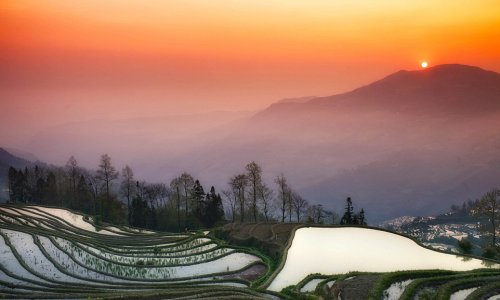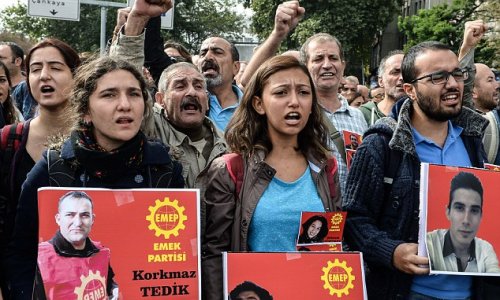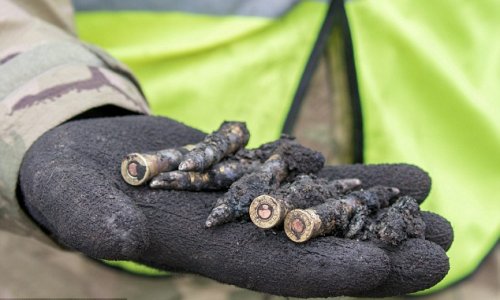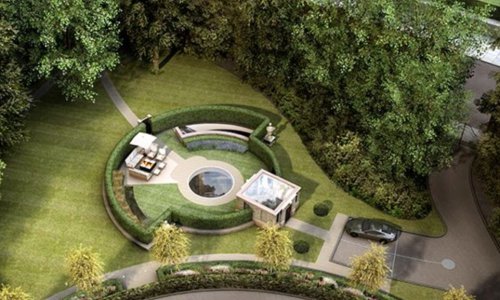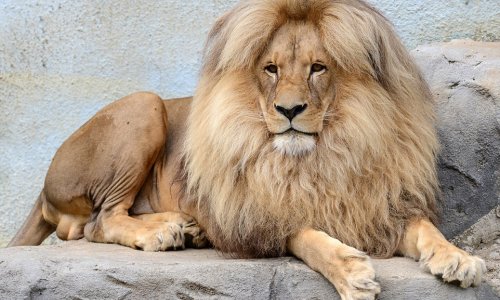They were palaces to rival Europe's finest, tended to by 1,000 staff, lined with Italian marble and decorated with Venetian chandeliers, while piles of diamonds and porn lay around and runways were built to accommodate Concorde to fly them to Europe from the heart of Africa.
They belonged to the men who ruled over Zaire and the Central African Republic after the end of colonialism; men who stood by while their countries fell into poverty while they lined their pockets with millions from the state's coffers, and even oversaw the murder of children.
But, as William Clowes discovered for Roads and Kingdoms, these homes of tyrants long since chased from their home countries are now slowly crumbling into the ground as nature slowly reclaims its land.
In the remote north of the Democratic Republic of Congo, in the tiny village of Kawele, sits the decrepit, melancholy palace of a dead tyrant. It's not exactly a tourist draw, and yet here I am, waiting at the foot of a two mile-long road for someone to open a set of large metal gates. Before long the village head arrives, dressed in shorts and t-shirt. After I pay a $15 fee, he unlocks the gates and invites me to follow him up the winding driveway.
The village consists of simple mud and thatch houses that jar awkwardly with the generosity their one-time neighbour bestowed upon himself. The man who used to live next door was Mobutu Sese Seko, the notorious dictator who ruled Zaire (now the DRC) between 1965 and 1997. The town from which I have just made the 15-minute journey is Gbadolite, the former president's ancestral village.
This is the first of two once-lavish compounds I've come to explore - the other across the border in the Central African Republic, once home to Emperor Jean-Bedel Bokassa, who ruled and terrorised that country from 1966 to 1979. Both palaces reflect an era of corruption and greed that still reverberates in the two war-torn countries today.
In Kawele, where Mobutu and his family once luxuriated, the palace is now a ruin. The roof is long gone and only an exoskeleton remains. The swimming pool is empty, filthy, and cracked. Everything is weeds and smashed masonry. At one time, liveried servants would have carried champagne buckets and platters of chilled salmon; now I am able to amble through the debris accompanied by villagers, who were once shut beyond the gates. The panorama from the hill on which the palace is perched is stunning and the vegetation is steadily reclaiming this emblem of corruption.
In 1960, the year the DRC secured independence from Belgium, Gbadolite was an unremarkable village of 1,700 souls. If not for Mobutu, chances are it would have remained that way. It is situated in the DRC's far north and enveloped in dense rainforest. It was never an obvious choice to be the beneficiary of generous attention from nation builders. Yet, Gbadolite's most famous son, born Joseph-Désiré Mobotu, had other plans, and they were mesmerizingly grand. Mobutu constructed two lavish palaces—one for hosting affairs of state and a private residence at Kawele, seven miles outside the town—and a village of Chinese pagodas. These shrines were stuffed with Italian marble, antique French furniture, Venetian chandeliers, expensive tapestries, and monogrammed silver cutlery. Fashionable chefs, Parisian patisserie, and Belgian mussels were flown in from the capital cities of Europe.
Gbadolite's airstrip was extended to accommodate a Concorde, which Mobutu would charter from Air France. The cellars burst with thousands of bottles of pink champagne and vintage wine. It took almost 1,000 expensively uniformed staff to keep the palaces shipshape; guests included Pope John Paul II, Boutros Boutros Ghali, several French presidents, and a 'who's who' of questionable businessmen. One Congolese politician has estimated that Mobutu spent up to £250million on his Gbadolite palaces.
Mobutu heaped further largesse upon the town he created. He built a luxury hotel (owned by the Mobutu family) to house visiting dignitaries and a hydroelectric plant to supply Gbadolite with constant electricity. He established a Coca Cola bottling factory as banks and other businesses rushed to set up branches in the town. As Mobutu's reign continued and the Zairean economy crumbled, Gbadolite thrived.
The town declined along with the dictator. By the mid-1990s Mobutu was dying of cancer and had more or less abandoned Kinshasa, the nation's capital, to unreliable subordinates, preferring to spend his time in comfort in Gbadolite surrounded by his family. On top of decades of mismanagement, Mobutu's steady withdrawal from public life helped create a vacuum into which stepped Laurent- Désiré Kabila, leader of a rebellion against Mobutu. Bolstered by the support of Rwanda and Uganda, Kabila swept through the country from the east, forced the Mobutu family into a Moroccan exile, and seized the presidency in 1997. Zaire died and the DRC was born. Mobutu's exit also deprived Gbadolite of its raison d'être and sent the town into a sharp decline.
One afternoon local doctors meet here for a seminar, but during three other visits I run into only the skeleton staff that maintains the hotel. One employee, Barthelemy, a restless and animated man, is nostalgic, like many citizens of Gbadolite. Most of all he misses being busy, having something to do.
As we sit alone in the poorly lit bar, he jumps up, grabbing a now obsolete telephone in the corner, and waxes lyrical about the years he spent running around accomodating the whims of presidents, heiresses, and businesspeople. He reminisces fondly about their demands for food and booze from every part of the world, at all hours. 'We ran out of everything. It was terrible but magnificent. Magnificent! There were cars everywhere, money everywhere, and work everywhere.' He sighs. 'Now, there is nothing. Life has changed.'
Considering Gbadolite's decay, I find it strange that the Mobutu family is still revered and that the town's anger is strictly reserved for those who replaced him. One of Mobutu's numerous sons represents Gbadolite in the national parliament, having won several elections in landslides. Locals blame their ills on the politics of faraway Kinshasa and the Kabila family (Laurent-Désiré was shot by his bodyguard and succeeded as president by his son Joseph in 2001.)
The town's residents feel that they have been punished by the country's leaders for the town's association with Mobutu and then Bemba (who currently languishes in The Hague, awaiting trial for crimes against humanity and war crimes). The people of Gbadolite discuss the president and the mayor he appointed to govern the town with a mixture of disinterest and contempt. 'We have been abandoned,' is a common refrain.
One of Gbadolite's few growth industries in recent years has been in aid work. The U.N.'s refugee agency has set up a major office in the town and been kept busy by the many thousands of Central Africans who have crossed into the DRC, escaping interreligious bloodletting in the Central African Republic (CAR). About a quarter of the nearly 100,000 Central Africans who have sought refuge in the Congo have been housed in a couple of tarpaulin cities near the town. The violence to Gbadolite's north has put further pressures on an area that is reliant on the CAR for most of its imports because of the poor logistics networks in the Congolese interior.
(dailymail.co.uk)









www.ann.az
Follow us !


